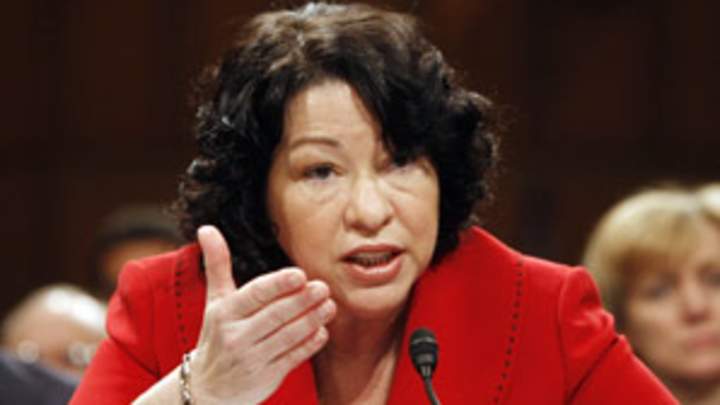Why NFL licensing case could be biggest sports decision in decades

While Michael Vick and Brett Favre dominating the off-field NFL chatter so far, there was the small news that the U.S. Supreme Court would hear the so-called "American Needle" case. The decision could have more impact on sports than any case in decades. SI.com caught up with senior writer Jon Wertheim, a non-practicing attorney, to explain how.
SI.com: What is the case about?
Wertheim: This case itself is not particularly sexy, but the possible ramifications are. An Illinois apparel company, American Needle, had been manufacturing caps for the NFL for many years. In 2000, it lost the contract and was not free to negotiate with individual teams, as the league signed an exclusive deal with Reebok. Narrowly speaking, the case centers on whether the NFL could control the licensing deal of individual teams. The broader question -- and it comes up all the time in sports law in a variety of contexts -- is whether a league is a single entity or a collection of "member" teams with different interests, able to negotiate independently.
The basis of antitrust law is that we like competition. It promotes efficiency. It promotes innovation. It helps consumers. But what is the competition? Here, is it 32 teams competing among themselves? Or is the NFL one "umbrella business" and the competition is another (currently phantom) league?
It's an interesting theoretical discussion. Imagine if, say, the Lakers tried to schedule 100 games, not the usual 82 next season. Crazy, right? You voluntarily join a league and you're subject to league rules, even if it's to your economic detriment. But what if, say, Vitamin Water offers the Lakers millions as a sponsor; yet Gatorade is the official sports drink of the NBA?
In the American Needle case, the 7th circuit ruled in favor of the NFL. From Judge Michael Kanne's decision, "NFL teams are best described as a single source of economic power when promoting NFL football through licensing the teams' intellectual property."
SI.com: Why did American Needle appeal to the Supreme Court?
Wertheim: Parties that lose a decision at a lower court level will often appeal, almost as a matter of course. The Supreme Court receives thousands of requests a year "requesting cert." Very few are granted. In a good year, the Court might hear 80 cases. What made this exceptional -- and, one assumes, why the Court has agreed to hear the case -- is that the NFL asked for Supreme Court review as well.
SI.com: Why would the NFL do this?
Wertheim: I don't see the NFL having a lot to lose here. And if the Supreme Court were to rule that the NFL is a single entity, this would be the ultimate legal validation. Different courts have ruled differently on this issue. If the Supreme Court weighed in, this, of course, would create an enormously impactful precedent. Apart from the NBA and Major League Baseball, there's not a sports organization in the country -- from the NCAA to a regional cable network -- that won't follow this closely. The Roberts Court has tended to be favorable to big business, and clearly the NFL lawyers believe the timing is right and they have the support on the bench. It's like getting a boardroom vote. "Who can I count on to support me?"
Here's another interesting tidbit: Sonia Sotomayor, whom we assume will be on the bench when this gets heard, actually ruled for the NFL and against Maurice Clarett in 2004. We don't necessarily think of Sotomayor as "pro business," and yes, Clarett was about a player and business, but still, it's interesting that she has already put her name to an opinion favoring the league.
SI.com: Practically speaking, what would a pro-NFL decision mean?
Wertheim: Well, this would go way beyond whether Reebok could be the sole supplier of jerseys. If the Court says that the NFL is a single entity -- one big, bad business that currently has no rival -- it could impact everything from salaries to free agency to television deals. Consider the case of owners "colluding" to prevent another owner from relocating. The owners would turn around and, pointing to this ruling, say, "We're all part of the same entity. You can't conspire with yourself." You can think of dozens of other examples based on the same principle. The leagues wouldn't be totally exempt from antitrust; they could be still be held liable for some monopolistic practices. But bringing a so-called Section 1 Sherman Act claim would be a lot harder.
SI.com: When will the Supreme Court hear this?
Wertheim: Well, here's another oddity: The Court asked the Solicitor General to review this -- basically: is this worth our time and effort to decide this? -- and, though the Solicitor General essentially advised passing, the Court is taking it on anyway. Because this was one of the last cases to be granted cert last session, it probably won't get heard until late fall at the earliest.
SI.com: So, what good would come out of a "single entity" decision?
Wertheim: From a fan perspective? I guess it depends on your values. This would strengthen leagues. It would certainly make it harder for a franchise to relocate. It would strengthen anyone with an exclusive contract, whether it's Nike or a network or a sponsor. It would hurt free agency, which, I suppose, some might view as a good thing. I don't see how it doesn't greatly undercut the power of unions and players' associations. However it turns out, with virtual certainty, it will affect the future of sports.
